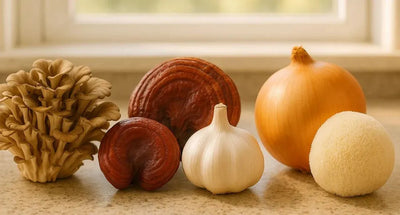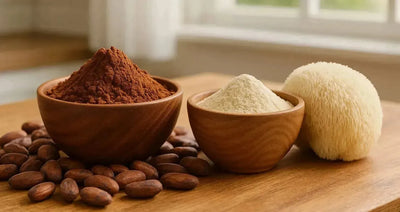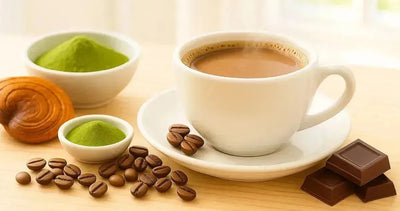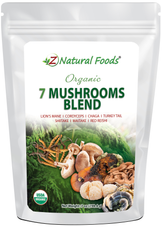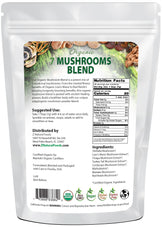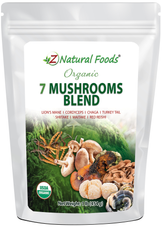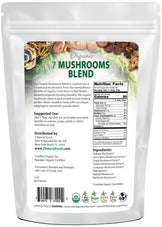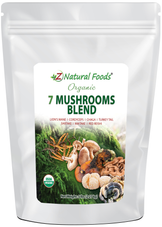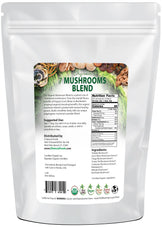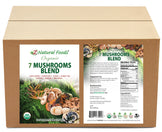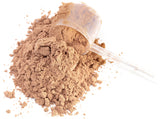Description
Description
If you have ever wondered what makes the Turkey Tail mushroom so special, you have come to the right place.
In this article we explore the science and research behind this incredible mushroom and what makes it so unique.
What is the research on Turkey Tail Mushrooms?
Turkey tail mushroom has impressive research regarding their nourishing qualities and benefits. Backed by human studies, this magnificent mushroom is universally considered the “great equalizer” for its ability to nourish and deeply support a healthy, balanced immune system response and microbiome support.
Let’s dig into what Turkey Tail mushroom is all about and what the science says.
About the Turkey Tail Mushroom
Coriolus Versicolor, commonly called Turkey tail mushroom, has a shape and multicolor appearance similar to a turkey's tail and is known in traditional herbal medicine as the cloud mushroom.
Sweet and bitter in flavor, neutral in temperature, turkey tail is a revered tonic mushroom discussed in A Ming Dynasty edition of the materia medica. It’s known for supporting the three treasures by;
- draining dampness,
- working as a powerful Qi and heart tonic,
- nourishing the spleen,
- reducing heat, and
- fortifying Wei Qi, aka the immune system.
Wei Qi is specifically associated with the lungs, and in Chinese medicine, if the energy in the lungs is well balanced, Wei Qi is strong.
Turkey tail contains one of the highest amounts of beta-glucans of all mushrooms. Go here for more information about beta-glucans and other polysaccharides in mushrooms.
Our mission is to answer your questions and provide a thorough explanation and the critical details necessary to understand this important topic.
Now, today we will answer the question…
What is the research on Turkey Tail Mushrooms?
Before answering this question, it is critical to understand how research is defined.
Research systematically investigates and studies resources to establish facts and reach new conclusions. The topic of research can be complex, but it is essential to understand its purpose.
Generally speaking, there are three primary purposes for conducting research.
- The first is to simply explore a topic. This specific purpose often won’t offer a conclusion, but it does support laying a foundation for collecting and analyzing data.
- Next is descriptive, which describes a sample population's behavior through data collection.
- Finally is understanding the impact of specific changes (explanatory research) on standards and procedures. In simple terms, the purpose of research is met by forming ideas, collecting data, analyzing results, forming conclusions, and applying them to real-life situations to create new research questions.
This leads to the most significant flaw in research;
reductionist thinking, specifically when looking at the benefits of plant and fungi medicinals.
Modern research is set up to evaluate compounds as isolated entities when much research has proven that when you fractionalize the whole, it will often show a significant differentiation of results.
Towards the end of this article, we provide a perfect example of this concept (separation of PKS and its lipid layer).
The science behind Turkey Tail Mushroom
PSP and PSK: The power-packed Polysaccharopeptides
A Polysaccharopeptide is a bioactive polysaccharide agent bound to a protein found in turkey tail mushrooms that can work as an immunomodulatory agent. PSP and PSK are known as polysaccharide-protein complexes.
A Healthline research verified article titled 5 Immune-Boosting Benefits of Turkey Tail Mushroom, made the following statements:
- “Turkey tail contains an impressive array of antioxidants, including phenols and flavonoids. One study detected over 35 different phenolic compounds in a sample of Turkey Tail mushroom extract along with the flavonoid antioxidants quercetin and baicalein.”
- “Krestin (PSK) and polysaccharide peptide (PSP) are two types of polysaccharopeptides found in turkey tail. Both PSK and PSP possess powerful immune-boosting properties. They promote immune response by activating and inhibiting specific types of immune cells and suppressing inflammation.”
More Turkey Tail scientific studies:
- “A review of 13 studies found that patients given 1–3.6 grams of turkey tail mushroom per day along with conventional treatment had a significant survival advantage.”
- “Another review of 8 studies in over 8,000 people with stomach cancers demonstrated that those who were given chemotherapy along with PSK lived longer after surgery than individuals given chemotherapy without PSK.”
- “An 8-week study in 24 healthy people found that consuming 3,600 mg of PSP extracted from turkey tail mushrooms per day led to beneficial changes in gut bacteria and suppressed the growth of the possibly problematic E. coli and Shigella bacteria.”
Turkey tail and Agarikon mushrooms are the subjects of FDA-approved studies in California for treating covid-19 patients with mild to moderate symptoms. While several researchers showed concern about the potential for “cytokine storms” when using mushrooms, immunologist Stephen Wilson, Ph.D. in a JAMA article, stated it is unlikely because mushrooms don’t mimic inflammatory cytokines.
“We think the mushrooms increase the number of immunologic opportunities to better see and respond to a specific threat. In the doses used, the mushrooms perturb the immune system in a good way but fall far short of driving hyper or sustained inflammation.” The results of this study are not currently available.
Turkey Tail as a potential prebiotic
In a study discussing the effects of turkey tail mushroom and amoxicillin on the gut microbiome of healthy individuals, it was concluded that the ingestion of the polysaccharopeptide PSP led to consistent microbiome changes.
Therefore, it showed that polysaccharides from turkey tail mushrooms act as a prebiotic.
Turkey tail mushroom as an adjuvant therapy
An adjuvant therapy is a type of therapy given along with primary therapy.
Medicinal mushrooms - specifically turkey tail - have been shown to be a very effective adjuvant therapy.
The University of Minnesota and Bastyr University (Kenmore, Washington) recently completed a phase 1 dose-escalation trial.
“They found that up to 9 g/day of a T versicolor (Turkey tail) preparation is safe and tolerable in women with breast cancer who had undergone chemotherapy.
Perhaps the most intriguing part of this study was the finding that 6 g of T versicolor appeared to lead to faster immune recovery after radiotherapy.”
Another study stated,
“Immunological results indicated trends in:
- Increased lymphocyte counts at 6 and 9 grams/day;
- Increased natural killer cell functional activity at 6 grams/day;
- Dose-related increases in CD8(+) T cells and CD19(+) B cells, but not CD4(+) T cells or CD16(+)56(+) NK cells.”
It is also believed that mushroom polysaccharides work by activating different immune responses in the host.
The action of polysaccharides requires an intact T-cell component; their activity is mediated through a thymus-dependent immune mechanism
It is vital to clarify much of what we just spoke about regarding turkey tail mushrooms and the value of their beta-glucan levels.
It is believed that the primary polysaccharides found in fungi are beta-D-glucans which come in various forms (beta 1-3 and 1-6) and are specific to fungi and yeast.
Other polysaccharides found in mushrooms are Alpha-glucans like glycogen, dextran, pullulan, and starch, which are not thought to provide the same nourishing qualities as beta-glucans. This belief tells you only part of the story and may be based on flawed science.
You may have noticed that most medicinal mushroom product labels focus on only beta-glucan levels; therefore, some important points must be clarified.
Here are six accurate facts about beta-glucans.
- Beta-glucans are a classification of compounds known as polymers.
- There are hundreds of beta-glucan shapes and sizes, and while some are biologically active, others are not. Furthermore, not all are immunologically active.
- Each species of fungi may contain a different beta-glucan.
- Beta-glucans can differ in function, solubility, and interaction with other molecules.
- While beta-glucan are potent compounds, they are just one variable of a wide range of compounds responsible for a mushroom's many nourishing qualities.
- Ultimately, beta-glucan levels are not necessarily the telltale sign of a product's effectiveness.
It is misleading to state that beta-glucan levels are the determining factor in the effectiveness of a mushroom product.
Beta-glucans are most effective when they work with all other constituents found in mushrooms, and if one or more are missing, it can change how effectively the end product works.
For example, a study discussing the polysaccharide K from turkey tail mushrooms showed that when lipase was applied, it reduced the immunological response of PSK by 80%.
This shows the importance of the associated lipids bound to the beta-glucans and that just their independent presence of them is not enough to obtain maximal benefits.
So, yes, Turkey tail mushroom has impressive research regarding their nourishing qualities and benefits.
Backed by human studies, this magnificent tonic is universally considered the “great equalizer” for its ability to profoundly nourish and deeply support a healthy, balanced immune system response and microbiome support.
You are invited to review our Organic Turkey Tail Mushroom here:
For more information about our mushrooms, visit these great resources:
- Types of polysaccharides in mushrooms (+beta-glucan facts)
- What are the three main parts of a mushroom?
- What is Maitake Mushroom used for? (+5 traditional uses)
- Which Mushroom Is Good For The Brain? (Explained)
- Most nutritious mushrooms (list of 7)
To review all of our mushroom products, go here:
